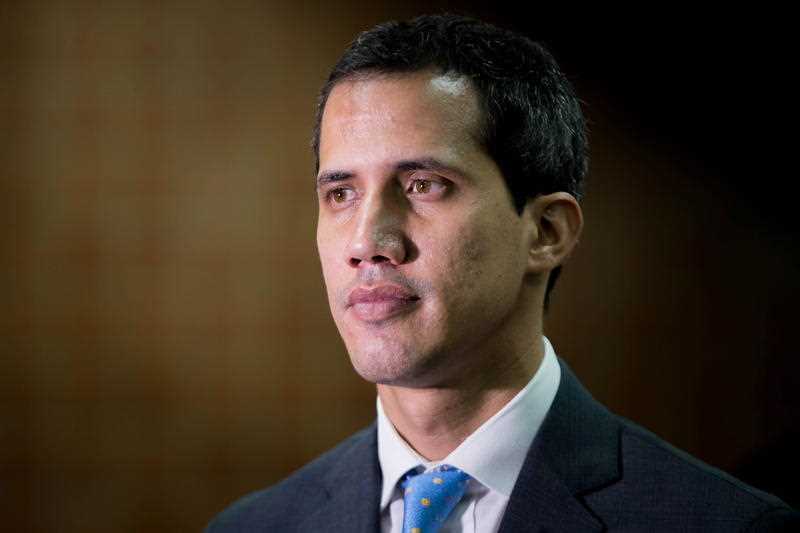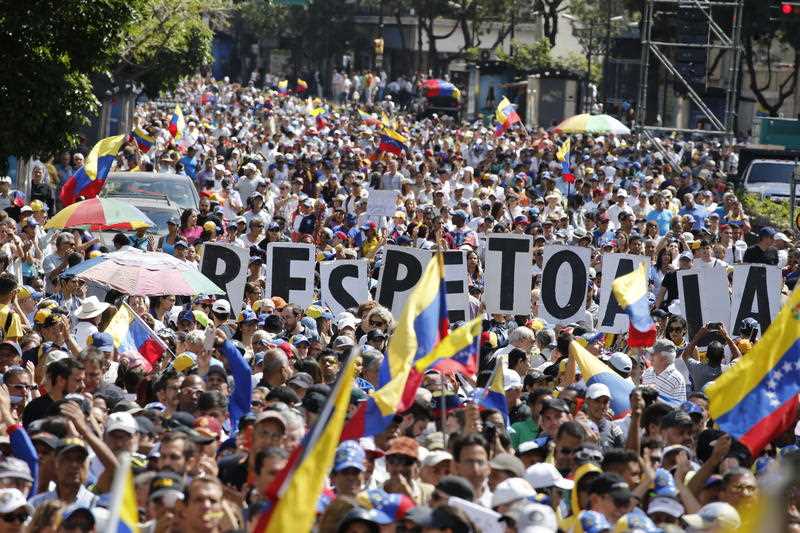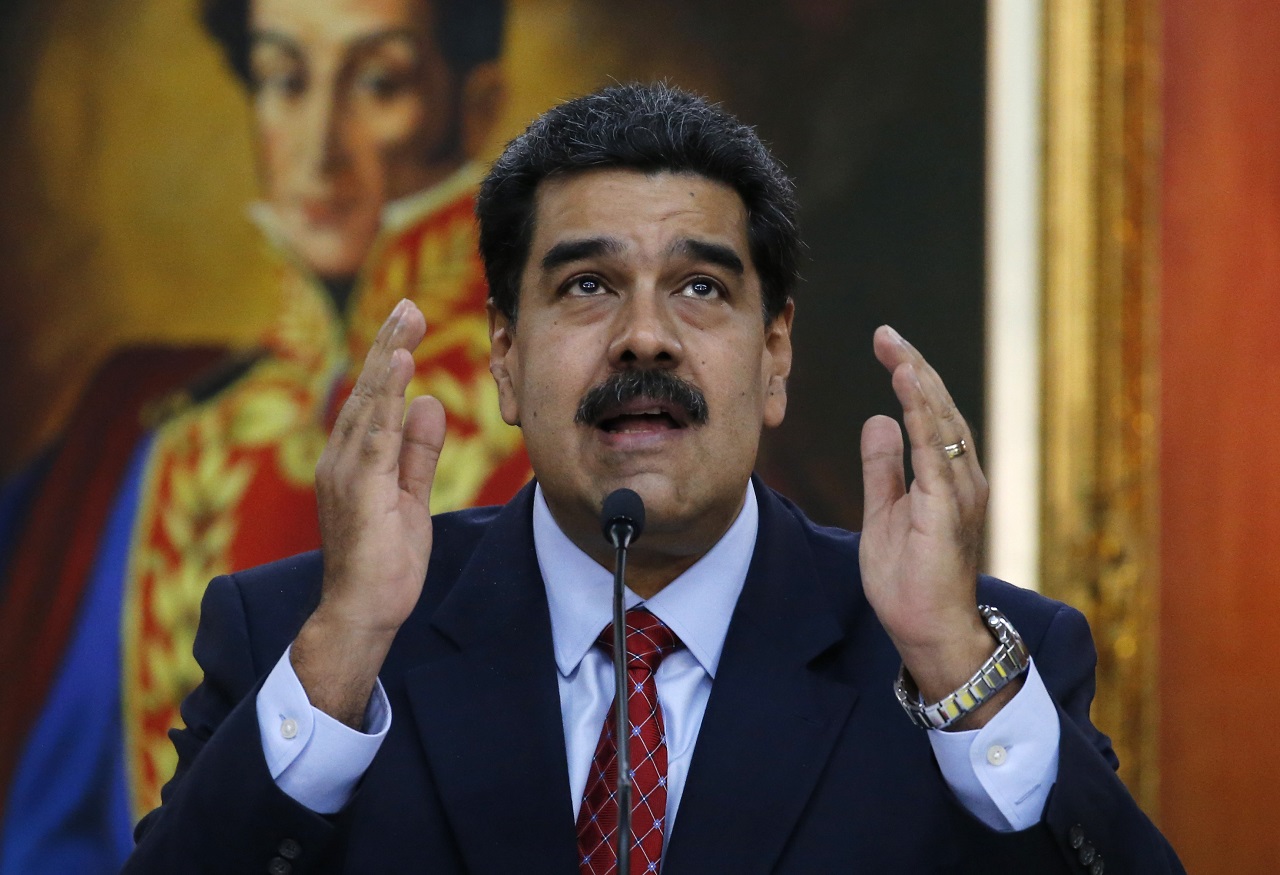Venezuela's opposition leader Juan Guaido announced on Tuesday that desperately-needed humanitarian aid would be brought into the country on February 23, despite opposition from President Nicolas Maduro.
US aid has been piling up in Colombia at the border with Venezuela but until now the bridge border crossing has been barricaded by the military, under Maduro's orders.
Earlier, tens of thousands of opposition activists flooded the streets of Venezuela to demand the military allow in aid, as Maduro's supporters rallied against "imperialist intervention."
Guaido called the Youth Day demonstrations to honor 40 people killed in anti-government rallies and press for the food and medicine to be brought into the economically-ravaged South American country.

Juan Guaido, who proclaimed himself interim president of the country in January poses for photos. Source: AP
While waiting for the National Assembly leader to speak in east Caracas, his supporters chanted: "Freedom!"
"We're asking the military authorities to let in the aid and to protect it so that it reaches those most in need," Juan Perez, 68, told AFP.
Guaido, who stunned the world on January 23 when he declared himself acting president, said the protest would "demand the entry of humanitarian aid that will save the lives of more than 300,000 Venezuelans."
Taking his authority from the constitution, Guaido says Maduro's presidency is "illegitimate" as it was founded on flawed elections.

Thousands march against the government of Venezuela's President Nicolas Maduro, in Caracas, Venezuela, Tuesday, Feb. 12, 2019. Source: AP
He is trying to force the socialist leader from power so he can set up a transitional government and hold new presidential elections.
Maduro meanwhile called a march of young leftists in the center of Caracas denouncing foreign intervention in Venezuela's affairs and collecting signatures of people who reject US President Donald Trump.
The fate of tons of aid piling up in Colombian collection centers at the border with Venezuela has become central to the power struggle between Guaido and Maduro, who is backed by the powerful armed forces.
Venezuela is in the grip of recession and hyperinflation while millions of people are suffering from a shortage of basic necessities. The UN says some 2.3 million people have fled since 2015.
Military exercises
But the military has barricaded a border bridge linking the countries, with Maduro describing the aid as a "political show" and a pretext to a US intervention.
Guaido, recognized by some 50 countries as interim president, has offered amnesty to military personnel who dump Maduro and told them that refusing to allow in aid was a "crime against humanity."
He says almost 100,000 Venezuelans have signed up as volunteers to help bring in aid and distribute it to those most in need.
"The military are the ones keeping Maduro in power. I call on them to reflect and take the side of the people suffering from hunger," said protester Maria Ballera, 75.
The Venezuelan government distributed food and medicine on Monday.
Guaido's envoys met Brazilian officials in Brasilia on Monday and announced plans to establish a second aid storage center in the state of Roraima, on Venezuela's southeastern border, from next week.
But Defense Minister Vladimir Padrino said the armed forces were deploying a "reinforced presence all along the border."
Although he has wide international support in his bid to oust Maduro, Guaido needs the backing of the armed forces.
He has warned the military that it will be held responsible for any deaths among the protesters on Tuesday.
The US has presented a draft resolution to the UN Security Council calling for international aid deliveries and new presidential elections.
Russian Foreign Minister Sergei Lavrov on Tuesday dismissed the move as an attempt to "cover up planned provocations... to destabilize the situation in Venezuela and even gain an excuse for direct military intervention."
Speaking to AFP last week, Guaido refused to rule out asking for foreign intervention.
The Venezuelan military meanwhile announced it had started conducting exercises, set to run until Friday, to "reinforce the country's defensive capacity."
Maduro wants gold
Venezuela is oil dependent and sells more than 40 percent of its crude, which makes up 96 percent of its revenue, to the US, while Washington is using sanctions as an attempt to starve Maduro's regime of its funding.
"Venezuela is in the eye of a global geopolitical hurricane," said Maduro, who claims Trump is trying to force him out in order to take control of Venezuela's oil reserves, the largest in the world.
In an interview with the BBC aired on Tuesday he called for Britain to return "more than 80 tons of gold" reserves deposited in London.
"Send a convoy with the 80 tons of gold. Let it come, the convoy of money, it's our money. With that we could solve our country's problems," he said.

Venezuelan President Nicolas Maduro has dismissed the need for aid. Source: AAP
UN Secretary General Antonio Guterres renewed his offer on Monday to help broker talks to end the political stalemate.
Guaido has rejected negotiations with Maduro, believing he would use them to buy time.
The European Union and a group of European and Latin American ministers have called for new presidential elections, but Maduro rejected both.



